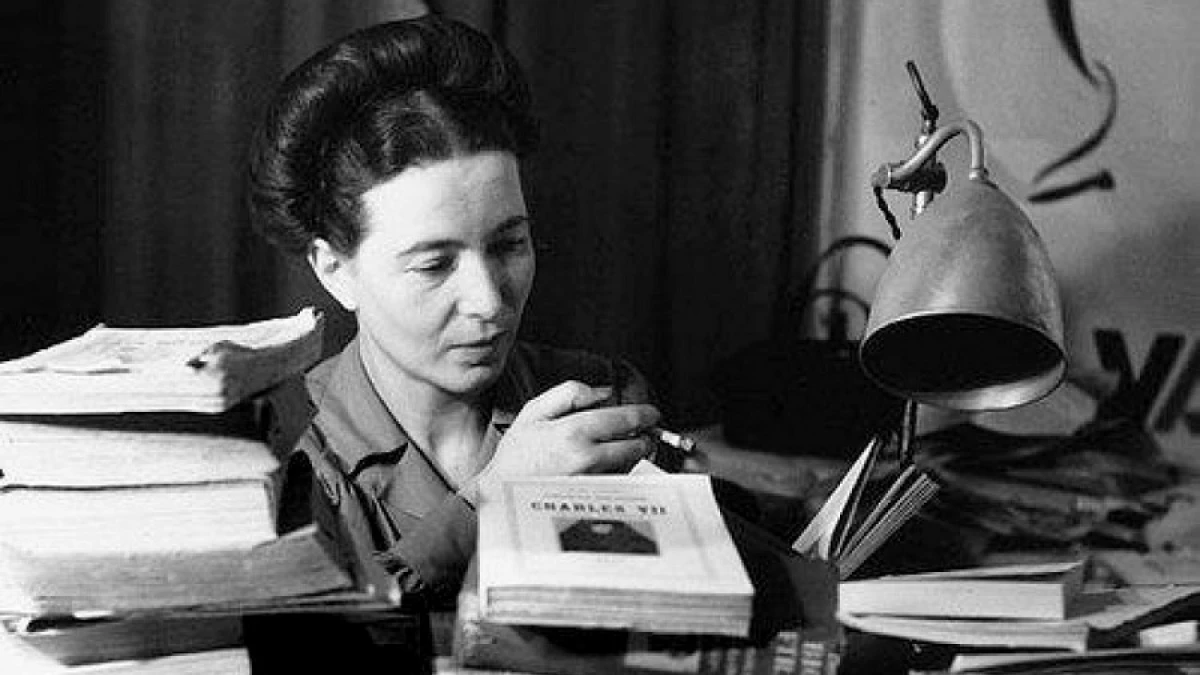(Paris, 1908-1986) French thinker and novelist, representative of the atheist existentialist movement and an important figure in the vindication of women's rights. Originally from a bourgeois family, she stood out from an early age as a brilliant student. She studied at the Sorbonne and in 1929 she met Jean-Paul Sartre, who became her companion for the rest of her life.
He graduated in philosophy and until 1943 he devoted himself to teaching at the lycées of Marseilles, Rouen and Paris. His first work was the novel The Guest (1943), followed by The Blood of Others (1944) and the essay Pyrrhus and Cineas (1944). She participated intensely in the ideological debates of the time, harshly attacked the French right wing and assumed the role of a committed intellectual. In her literary texts she revised the concepts of history and character and incorporated, from an existentialist point of view, the themes of "freedom", "situation" and "commitment".
Together with Sartre, Albert Camus and Maurice Merleau-Ponty, among others, she founded the magazine Tiempos Modernos, whose first issue was published on October 15, 1945 and became a political and cultural reference of French thought in the mid-twentieth century. Subsequently, he published the novel All Men Are Mortal (1946), and the essays For a Morality of Ambiguity (1947) and America a Day (1948).
Her book The Second Sex (1949) was a theoretical starting point for various feminist groups, and became a classic work of contemporary thought. In it she elaborated a history of the social condition of women and analyzed the different characteristics of male oppression. She asserted that by being excluded from the processes of production and confined to the home and reproductive functions, women lost all social ties and with them the possibility of being free. She analyzed the gender situation from the point of view of biology, psychoanalysis and Marxism; she destroyed feminine myths, and urged the search for authentic liberation. She argued that the struggle for the emancipation of women was distinct from and parallel to the class struggle, and that the main problem to be faced by the "weaker sex" was not ideological but economic.
Simone de Beauvoir founded with some feminists the League of Women's Rights, which set out to react firmly to any sexist discrimination, and prepared a special issue of Modern Times devoted to the discussion of the subject. She won the Prix Goncourt with The Mandarins (1954), in which she dealt with the difficulties of post-war intellectuals in assuming their social responsibility. In 1966 she participated in the Russell Tribunal, in May 1968 she showed solidarity with the students led by Daniel Cohn-Bendit, in 1972 she presided over the Choisir association, in charge of defending free contraception, and until her last days she was a tireless fighter for human rights.
Her abundant testimonial and autobiographical titles include Memoirs of a Formal Young Woman (1958), The Fullness of Life (1960), The Force of Things (1963), A Very Sweet Death (1964), Old Age (1968), The End of Accounts (1972) and The Farewell Ceremony (1981).
Megathreads and spaces to hang out:
- ❤️ Come listen to music and Watch movies with your fellow Hexbears nerd, in Cy.tube
- 💖 Come talk in the New Weekly Queer thread
- 💛 Read and talk about a current topics in the News Megathread
 Come talk in the New Weekly PoC thread
Come talk in the New Weekly PoC thread- ⭐️ September Movie Nominations ⭐️
reminders:
- 💚 You nerds can join specific comms to see posts about all sorts of topics
- 💙 Hexbear’s algorithm prioritizes comments over upbears
- 💜 Sorting by new you nerd
- 🌈 If you ever want to make your own megathread, you can reserve a spot here nerd
- 🐶 Join the unofficial Hexbear-adjacent Mastodon instance toots.matapacos.dog
Links To Resources (Aid and Theory):
Aid:
Theory:

I hate the jam session scene in my city now
The best spots have died due to covid. I had a spot where there two jams in one night. I would stay the entire night and just absorb. My favorite spot and my lodestone for doing this shit. Now most of the spots are run by young guys and often rich white kids. These places have terrible atmosphere and community and are super cliquey. The mentorship aspect of the jam session does not exist either. Lastly, winter slows everything to a grinding halt. There is one good jam right now that didnt stop. The city is in a shadow of its former self. And to think it used to be even better.
Everyone hits the ground super good, when I first started doing this there were other people who were grinding out the suck. People being good isn't bad but it creates two issues.
Everyone shows up and just expects to be worshipped. They're all good but not that good. Learning the music in high school creates a weird atmosphere that makes these kids have weird perceptions of the real world and grinding things out. One thing I've noticed is that rich white kid has been an archetype in my musical life forever but I would also say most of them leave the city after realizing that there's no one to give them a magical gig and that it's not fun to be poor.
People show up to jams late because what they have going on is more important than listening to the house bands set. And you definitely need to go and masturbate all over Night in Tunisia or something, because again you're so awesome.
I went to a jam session last night only to find out its off till February, literally third time in a row this happened to me.
Sorry Mokey. Your posts about music make it sound like it's uphill all the time. I wish it wasn't like this. It'd be nice if there was more music in the world. : (
But, respect for sticking with it even with the bullshit.
Ive had a very unconventional journey with it for sure, its not that bad though, Ill try to post about good things too.
The musicians who are good people really stand out in this enviroment